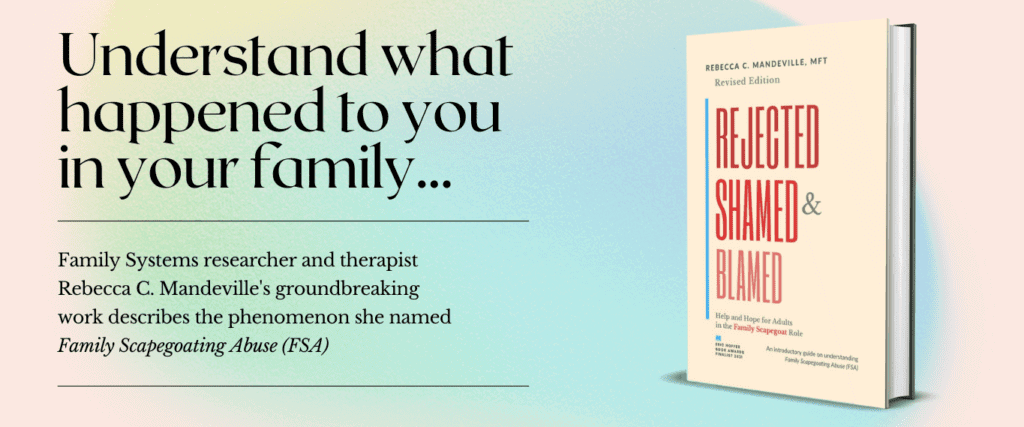Rebecca C. Mandeville is a Trauma-Informed Psychotherapist and Recovery Coach, Educator, Clinical expert in the YouTube Health Partner, and author of Rejected, Shamed, and Blamed. She is a thought leader in the field of Family Systems and what she named ‘Family Scapegoating Abuse’ (FSA) and a pioneer in identifying the overlapping symptoms of family scapegoating abuse (FSA), complex trauma (C-PTSD), betrayal trauma, and the devastating impact and effects of intergenerational trauma on adult survivors of dysfunctional and narcissistic, family systems.
Family Scapegoating Abuse (FSA) can occur in both dysfunctional and narcissistic families. In a narcissistic family system, where a family is dominated by a narcissistic parent, the needs of the disordered parent take precedence over the needs of the child. Family members are not cherished individuals to be loved; they are instead ‘narcissistic supply’ whose only purpose is to serve the infantile, primitive psycho-emotional needs of the narcissistic parent. In such families, the Family Projective Identification Process may or may not be at play. Scroll down for video on this topic from my YouTube channel.
What Is Narcissistic Personality Disorder?
Nearly all of us will exhibit traits of narcissism from time-to-time, which is why some researchers assert that narcissism exists on a spectrum or on a continuum. In fact, putting ourselves first can be a critical aspect of self-care, contributing to a sense of self-worth and healthy self-esteem.
However, a percentage of any given population will qualify clinically as having Narcissistic Personality Disorder (NPD), which is a diagnosable mental illness. Despite decades of theory and research, it is not yet known how exactly a narcissist is ‘created’, although there appears to be progress in the field of Cognitive Neuroscience regarding identifying brain abnormalities in those with clinical NPD. It is also theorized that narcissists may have been abused or traumatized as children, or over-praised, idealized, and objectifed by a parent, resulting in a lack of empathy and a dehumanizing view of others. Learn more about the latest research on Narcissistic Personality Disorder and malignant narcissists here).
Per the Diagnostic and Statistical Manual of Mental Disorders (DSM-5), signs and symptoms of Narcissistic Personality Disorder include:
A pervasive pattern of grandiosity (fantasy or behavior), need for admiration, and with lack of empathy, beginning by early adulthood, as indicated by at least five of the following:
- Has a grandiose sense of self-importance (e.g., exaggerates achievements, expects to be recognized as superior without actually completing the achievements)
- Is preoccupied with fantasies of success, power, brilliance, beauty, or perfect love.
- Believes that they are “special” and can only be understood by or should only associate with other special people (or institutions).
- Requires excessive admiration.
- Has a sense of entitlement, such as an unreasonable expectation of favorable treatment or compliance with his or her expectations).
- Is exploitative and takes advantage of others to achieve their own ends.
- Lacks empathy and is unwilling to identify with the needs of others.
- Is often envious of others or believes that others are envious of them.
- Shows arrogant, haughty behaviors and attitudes
Excerpted from https://www.psychiatry.org/psychiatrists/practice/dsm
To better understand the clinical aspects of Narcissism, read this article by Dr Sam Vaknin, who coined the term ‘Narcissistic Abuse’ many years ago.
Understanding FSA in the Narcissistic Family System
In the Narcissistic Family System, the parent (or primary caregiver) is not interested in being a loving, concerned parent that puts the needs of their child first. Instead, the narcissistic parent expects – even demands – that their spouse and children revere and worship them, much as a cult leader demands compliance and adoration from their cult members.
Children are groomed from a very young age to serve as a mirror that reflects back to the parent their own faultless image. The child that reflects the parent in the most satisfying ways will inhabit the role of golden child in the family system (the exalted and protected child that can do no wrong), while the scapegoat child is destined to carry the narcissistic parent’s repressed self-hatred and disowned darkness, ‘badness’, or ‘shadow’ parts.
When a parent is a malignant narcissist, family members are nothing more than dehumanized objects who are used to prop up the narcissistic parent’s false personae – the puffed up, aggrandized, and idealized self that others must constantly reflect back to them. The spouse and children of the malignant narcissist are not able to exist and function as whole, human selves with feelings, thoughts, needs, and wants of their own. They exist only to serve the intrapsychic needs of the narcissist, which are twisted, endless, and primitive in nature (primitive, because the seeds of narcissism are planted in early childhood, which arrests the healthy development of the psyche).
The Narcissistic Family as Cult System
The fact that the narcissistic family operates similarly to a cult should not be too much of a surprise, given that both of these social systems orbit around a powerful ‘leader’ who controls and dominates members of the group. In short, the narcissistic family adapts and conforms to whatever reality and narrative the narcissistic parent promotes and espouses. Another similarity is that the narcissistic family and the cult ‘family’ are both closed systems, while healthy systems are open.
Specifically, open systems allow elements and situations outside the family to influence it, whereas closed systems isolate its members from the environment and are growth-inhibiting and self-contained. In the closed, narcissistic family system, family members revolve around, and are controlled by, the worldview of the narcissistic parent, largely immune to outside influences.
In the narcissistic family, rebellions are rarely possible, as any threat to the narcissist’s position as the system’s power-holder and leader will be met with various forms of cruelty toward the offender(s), including punishment, rejection, and even ‘ejection’ from the family system – something that adult survivors of family scapegoating abuse may be all too familiar with.
It is simultaneously fascinating and horrifying to note that the very same methods used by a cult leader to control their members are used by the narcissistic parent to control their spouse and children. These techniques include splitting (deliberately pitting one family member against another), triangulation, and gaslighting, as well as doling out unexpected rewards and punishments as a means to manipulate and control specific family members. The types of rewards and punishments meted out by the narcissistic parent typically revolve around dispensing positive or negative attention toward a particular family member to incite feelings of love and acceptance or fear and rejection, including fear of being rejected or discarded by the narcissistic parent.
For example, the golden child might be lavished with love, gifts, and special privileges, while the scapegoat child is rejected, marginalized, and ignored. It is not uncommon for the scapegoated child to be deprived of parental benefits or blatantly and intentionally ostracized or humiliated – not just now and again, but sometimes chronically, for years. The family might be further emotionally terrorized and unbalanced by the narcissist re-assigning roles unexpectedly, e.g., the golden child suddenly becomes the scapegoat child, and vice-versa.
Trauma Bonding and Narcissistic Abuse
Because healthy attachment is not possible between a child and their narcissistic parent, the possibility that the client experiences trauma bonding with their disordered, narcissistic parent must not be overlooked.
Trauma bonding is a powerful, confusing form of attachment that is rooted in periodic cycles of abuse followed by surreal displays of affection that serve to cement and reinforce the all-consuming power of the disordered parent over their child’s psyche. This results in the child (and other affected family members) living in a fear-based survival state, where their ability to function and even exist resides in the hands of the narcissist power-holder, who is, in a sense, a ‘mini-God’ that controls their fate and environment.
Family life is reduced to a war zone, of sorts, where frightening, possibly life-threatening events can take place unexpectedly, fueled by the narcissistic parent’s displeasure or rage. Given that such extreme, negative dynamics are too much for family members to bear, they will strive to appease the narcissistic parent’s unpredictable temper and inflated ego as a means of minimizing threats to their own physical or psychic survival. This often leads to the development of trauma bonding, i.e., a twisted survival-alliance that is misinterpreted as a close loving bond by the victim toward their narcissistic abuser (also known as Stockholm Syndrome).
Recovering From Narcissistic Family Abuse
When an adult survivor of narcissistic family abuse first seeks out psychotherapy, they will often have no idea that they grew up in a dysfunctional or narcissistic family system. If they are the scapegoated adult survivor of a narcissistic family system, they will often present with feelings of extreme confusion, sadness, rage, and (upon further assessment) symptoms of complex trauma (C-PTSD).
Recovery therefore begins with psycho-education regarding growing up in a narcissistic family system and the impact that this has had upon their psyche, likely from a very early age. Identifying their ‘role’ in the family (e.g., golden child, scapegoat, caretaker, clown, etc) will also add much-needed insight in regard to how the client / adult survivor has been impacted.
Identifying maladaptive survival responses is also a critical part of recovering from narcissistic family abuse. Maladaptive survival responses are ways of coping that allowed the adult survivor to adapt to their dysfunctional, abusive family environment, but do not serve them well today. For example, appeasing behaviors that helped the child avoid the wrath of their narcissistic parent may in actuality be the trauma response of fawning, and will need to be addressed as part of a trauma-informed recovery process.
While the adult survivor of narcissistic family abuse comes to terms with the mental and emotional damage done to them (and even bodily damage, when C-PTSD symptoms are present), powerful emotions will begin to reveal themselves. Each wave of grief, pain, and rage must be compassionately attended to as the numbness of living in a chronic state of survival recedes and awareness and clarity take hold.
Missed or delayed developmental steps (such as those that promote healthy individuation and secure attachment) will also need to be assessed, acknowledged, and explored. The ability to perform basic self-care due to having their own needs minimized within their narcissistic family system is also typically impaired, and must be learned, along with other basic life skills throughout the recovery process. In the later stages of recovery, clients reach a state of ‘radical acceptance’; they are able to acknowledge the many twisted and unfair things that happened to them, while takinghttps://youtu.be/eRlLWzpALu4 responsibility for their healing with an eye toward building a life that supports their well-being and psycho-emotional health.
Although recovering from narcissistic family abuse is a laborious and intensive endeavor, reclaiming the integrity of one’s psyche and soul is indeed possible, and I see this everyday in my psychotherapy and recovery coaching practices. Maladaptive survival responses can be transformed, healthy attachments can be cultivated, grief and rage can be released, healthy boundaries and coping strategies can be established, and the true self can be reconnected with and embodied.
Learn More About Narcissistic Family Systems and FSA
For more information about family scapegoating abuse (FSA) and narcissistic family systems, check out my Amazon best-seller, Rejected, Shamed, and Blamed. If you found this article helpful, consider sharing it with others via the social media icons, below.
Purchase Rejected, Shamed, and Blamed from Amazon to learn more about family scapegoating and toxic family systems


Comments are public – Please do not leave sensitive or identifying information.